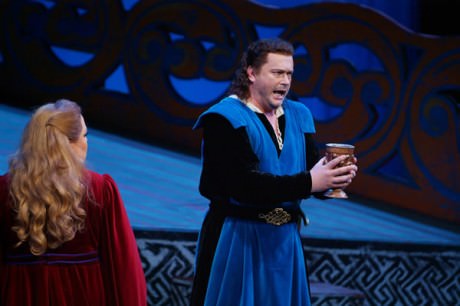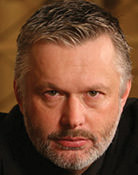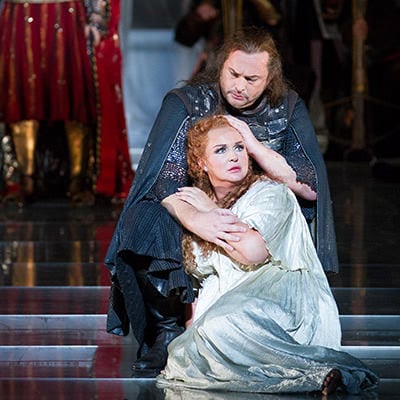British tenor Ian Storey plays Tristan in Washington National Opera’s
Tristan and Isolde

Leslie: You’ve performed the role of Tristan in opera houses from Berlin to Glyndebourne, under the baton of gifted conductors from Daniel Barenboim to, here in DC, Philippe Auguin, and directors from Patrice Chéreau to Neil Armfield here. Have there been any salient differences in approach by these directors and conductors? Have there been any common threads—that is, common in their differences: certain elements or passages that seemed to draw each one’s interest, and that each had his own particular interpretation of?

Ian: Everyone has his own traits, if you like. I think most of the productions, they’ve stayed close to the text. One or two have not been very sensitive to the music, to the singers, and you just don’t want to work with them again. But doing this role has been a wonderful experience. The stage director and the conductor are very sensitive to the intimacy of the piece.
People think of Wagner as loud, but that’s because they don’t really know the music. In Act III of Tristan, there’s lots of pp and ppp.
Their love is very convincing, by opera standards: in Act II, they keep going back for kisses and embraces, smiling softly, gently touching fingertips. Yet when Isolde welcomes the returning Tristan in Act II, both of them rapturously intoxicated with the love potion, I noticed that you do not rush into each other’s arms, although the situation, and the music and lyrics, would suggest an ungovernable passion. Was this an intentional blocking?
A bit of love potion given by a maid, even a good whisky wears off. They were just being prudently careful. And we have plexiglass flooring; have to be careful. But we’re talking suspension of disbelief. It’s an opera.
What about when the lovers lie on their backs and sing? Have you ever done this before? If not, how did you react when you were first told about this?
Sometimes it’s good, sometimes it isn’t. But if you’ve got good technique, you can sing in any position. Once I sang “Dio mi potevi” [as Otello] at a 45-degree angle.
That said, there are two words a singer needs to learn early: No and why. No, to agents; why, to stage directors. If they can’t explain why, don’t.
In a discussion at the Goethe Institute, Tristan’s director, Neil Armfield, said that he told the production’s King Marke, Wilhelm Schwinghammer, to “imagine you’re in a Bergman film.” Did he give you any similar suggestions or directions?
No. My job is to recreate reality, not a stylistic version of reality. It’s not “acting”; it’s more “being.” tend to rely very much on instinct. If something goes wrong, there’s something I can do to fix it. In Britain, they see opera as elitist. Basically, it’s musical drama.
It’s “the only Wagner opera that doesn’t mention God,” Armstrong said, “but it’s the one that everyone says is the most spiritual.” What is it about Tristan—parts of your role, or other parts of the opera—that for you makes it especially spiritual?
It’s all spiritual and philosophical. You’ll notice, no one says, I love you.”
At the Goethe Institute discussion, Conductor Philippe Auguin noted that Kurwenal’s music is in a major key until he dies, “on the leitmotif of desire.” James Rutherford, the production’s Kurwenal, said that “the true love that Kurwenal holds for Tristan is unbelievable.” And it comes across at the end, Kurwenal, as would a loving friend, dips a rag in cool water and bathes Tristan’s feet, hands, and brow. What are your sensations as you lie there under those hot lights, utterly still and barely breathing, for a good long time?
Kurwenal is like a faithful dog. I’m always relaxed when I get to Act III. A lot of people remark that I don’t even look like I’m breathing. I’m a sportsman, so I can control my breathing. Be steady… just chill out.

The biggest problem is cramps. It’s chilly, and the muscles get cramped. When Isolde comes down and massages my chest and arms, I can raise my right arm a bit [the sight line blocked by her form]. It’s hard when you have to fall to the floor, because you can’t always fall in the same position.
I would have preferred more darkness in Act II, where the doomed lovers sing a passionate hymn to their love and to the night, “O sink’ hernieder, Nacht der Liebe.” Did you talk about this with the director? How does the setting influence, if it does, your perception of the scene, your reaction to your partner, and your performance of the role?
We don’t notice it on stage; we’re in the light anyway. I personally don’t care about costumes. In one production of Otello in Act IV I had to wear a thong and had to have a full body wax. But the thong fell away—and there was only one part of me that was white. We were able to conceal it, but it wasn’t easy.
What is it like to sing and move on that wire-suspended raked platform?
It’s actually quite nice; I don’t have a problem with it—except for the static electricity, which really builds up in the dryness.
I noticed that Tristan’s long, flowing hair is gone in his death scene. What happened to it?
It’s just tied back. Need to keep the hair out of my face. Everything has to look stark and simple.
Any final thoughts?
This is my 54th and 55th performance of Tristan. My 50th was at La Fenice in Venice. It’s a role I never get tired of—one of the few pieces in my repertoire that the more you seek, the more you find. There’s always something to put a new complexion on. No matter how many times you do it, no matter how many times you see it, the only rule, the only certainty, is that every time—you will find something new.
Tristan and Isolde plays through September 27, 2013 at Washington National Opera at The Kennedy Center’s Opera House – 2700 F St. NW, in Washington, DC. For tickets, call the box office at (202) 467- 4600, or purchase them online.
LINK
Ian Storey’s website
‘Tristan and Isolde’ at Washington National Opera by Jessica Vaughan review on DCMTA.




